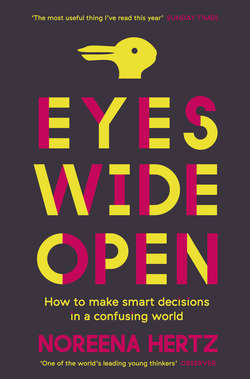Читать книгу Eyes Wide Open: How to Make Smart Decisions in a Confusing World - Noreena Hertz - Страница 25
How to See with Eyes Wide Open
ОглавлениеTo make smart decisions we need the right information to guide us. That is a given.
This means being aware of how instinctively tunnel-visioned we can be, of how some information glitters much more brightly than others – some of which may well turn out to be fool’s gold.
It means becoming more conscious of the way we are drawn to what’s most familiar or most obvious, or closest to what we want to hear. Of how little attention we pay to what we don’t want to know. Of just how caught up in our past we can be, and how this can disable our ability to process the present or imagine the future.
Being aware is a start. But there’s more that we can do to ensure we see with eyes wide open.
One thing we can do is to give ourselves more time – time both to gather the right information, and to consider it. I know that for many of us time feels like a luxury we just don’t have any more. But as Dr Alter makes explicit, ‘In order to think well, especially in hectic circumstances [and he’s talking about decisions made by doctors in the ER here], you need to slow things down to avoid making cognitive errors.’59
You need time to ask yourself what you may not have thought about, time to consider alternatives, time for your eyes to dart around the picture.
Time pressures encourage tunnel or distorted vision, while the best ideas often emerge after a reflective pause.
So, can you take a beat before you make your decision?
More generally, is there a way you can give yourself more time so that you can properly take in what it is you need to?
Barack Obama advised David Cameron that ‘The most important thing you need to do is have big chunks of time during the day when all you’re doing is thinking. Without that you lose the big picture.’60 And without the big picture, as we’ve seen, we risk not seeing those snakes.
So, can you batch your emails and respond to a group of them in one go? Is there anything more you can delegate to others? How else can you carve out your own thinking time? Many of us feel that this just isn’t possible in our hyper-hectic lives, but if the President of the United States can find the time, surely you and I can too?
Alternatively, can you just slow down your decision-making process? Who or what can help you take that pause? Doctors and pilots have been found to profit from following a checklist even when doing things they have done many times before. By slowing them down, the list makes them more methodical and less vulnerable to making the kind of cognitive errors we discussed earlier.61 Might a system like that work for you?
You should also ask yourself who can help you interrogate your own ways of thinking, help force you to see everything in the jungle, not just what you’re most drawn to. Who can serve as your Challenger in Chief, as we explored earlier?
Before we move on to the next Step, it’s also worth reminding ourselves of the following.
First, that the further into the future the outcome of your decision will play out, the less likely that what worked before will prevail. It’s a basic law of probability – so if you can make your decision as late in the day as possible, do.
Second, that decisions are best made with built-in flexibility. So, if possible, don’t fix yourself to Plan A. In a world as fast-changing as ours, try whenever you can to have Plans B, C and D in your back pocket.
Third, bear in mind that in order to work from the best intelligence possible, you’ll need to make assessments on an ongoing and continuous basis. This means keeping your eye on the present and the future, not only on how things once were. Actively ask yourself, ‘What is different now?’ ‘What could be different tomorrow?’ And then think through the implications of this for the decisions you’re currently making and the information you’re presently seeking out.
And finally, give yourself permission to break from the past and try something unprecedented, especially if it’s an affordable punt. The pay-off can be quite remarkable. Bloomsbury Publishers made a multi-million-pound return on Barry Cunningham’s initial £2,000 investment.
As Barry said to me, ‘Probably the best investment in publishing ever.’
